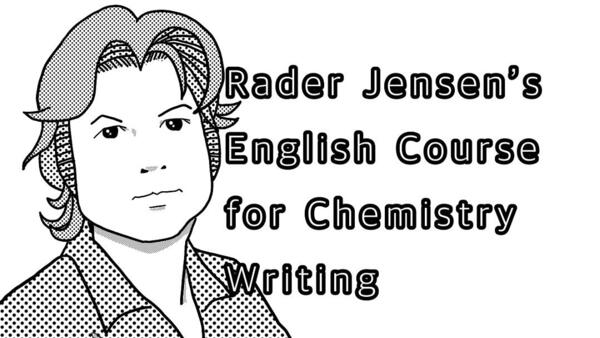CSJ Journals
[化学論文のための英語講座] 第17回:現在進行形・過去進行形・現在完了進行形 Part2
(English version is here.)
今回は、これまでの時制の復習をしましょう。次の文章を読み、括弧内の選択肢の内、一番適切なものを選んでください。
Recent progress in transition metal catalysis 1. (is/ was/ has been) largely dependent on the development of supporting ligands, because ligand properties 2. (dominate/ dominated/ have been dominating) the catalytic properties of the 3. (resulting/ resulted) metal complexes. Although phosphanes, imines, and pyridine derivatives 4. (were/ are/ are being) most widely used, novel ligands with unique properties 5. (are recently emerged/ have recently emerged/ have been recently emerging). For example, N-heterocyclic carbenes, due to strong σ donation, 6. (lead/ led/ have led) to significant improvement in Grubbs-type metathesis. More recently, phosphaalkenes 7. (are/ are being/ have been) investigated as new ligands. We 8. (reported/ have reported/ are reporting) highly efficient catalysis using 1,2-diaryl-3,4-diphosphinidinecyclobutenes as bidentate phosphaalkene ligands (DPCB). We 9. (report/ reported/ are reporting) here the synthesis and coordination chemistry of 1-phosphaethenyl-2-phosphanylferrocenes with planar chirality, which 10. (have been/ were, are) prepared with the following goals in mind: (1) direct comparison of the ligand properties of phosphaalkene and phosphane, (2) application of phosphaalkene ligands to catalytic asymmetric reactions.
Taken from: F. Ozawa et al., Organometallics 2008, 27, 6279.
訳文:遷移金属触媒の最近の進歩は、配位子の特性が得られる金属錯体の触媒特性を支配するため、支持配位子の開発に大きく依存している。ホスファン、イミン、ピリジン誘導体が最も広く使用されているが、最近ではユニークな特性を持つ新しい配位子が登場している。例えば、N-ヘテロ環カルベンは、強力なσ供与により、グラブス型メタセシスの大幅な改善につながった。さらに最近では、新しい配位子としてホスファアルケンが研究されている。私たちは、1,2-ジアリール-3,4-ジホスフィニジンシクロブテンを二座のホスファアルケン配位子(DPCB)として用いた高効率な触媒作用を報告している。ここでは、以下のような目的で合成された、平面的なキラリティーを持つ1-ホスファエテニル-2-ホスファニルフェロセンの合成と配位化学について報告する。(1)ホスファアルケンとホスファンの配位子特性の直接比較、(2)ホスファアルケン配位子の触媒的不斉反応への応用。
[解答]
1. has been
「遷移金属触媒作用の最近の進歩は支持配位子の開発に大きく依存している」は最近まで継続しているので「has been」が適切です。キーワードは「recently」です。「recently」がなければ「is」が適切になり、「recently」の代わりに「in the past」があれば「was」が一番適切になります。
2. dominate
「配位子の特性が得られる金属錯体の触媒特性を支配する」と性質を述べていますので現在形「dominate」が適切です。ここに過去形と現在完了進行形を使うのは少し不自然な印象を与えます。
3. resulting
論理的に考えるとどちらでも良いようですが、この文の構造ではいつも動名詞を使いますので「resulting」が適切です。
4. are
「ホスフィン、イミン、およびピリジン誘導体が最も広く使用されているが」は一般的なことなので現在形「are」が適切です。「are being」は一時的な感じを、「were」はもう完了した感じを与えます。
5, have recently emerged, have been recently emerging
「have recently emerged」は文の流れに一番合いますが、「have been emerging」でも間違いではありません。「are recently emerged」は間違いです。
6. have led
「例えば、N−ヘテロ環カルベンは、強力なσ供与により、グラブス型メタセシスの大幅な改善につながった」というこの文脈では「最近から今まで」という感じがありますので「have led」が適切です。ここで「lead」と「led」は両方とも利用できますが、「have led」が最も文の流れに合います。
7. have been
「最近では、ホスファアルケンが新しい配位子として研究されている」は文の流れに合わせて「have been」を使用すると、「最近から今までずっと行っている」という印象を与えます。ここでは「are being」と「are」の両方とも利用できますが「have been」が一番流れによく合います。
8. have reported
この文については、正しい選択をするために、文章全体の文脈でそれを見る必要があります。すなわち、この文に述べている著者らのDBCPについて研究は本論文の研究とは別であるので「are reporting」は合わないです。
ここで「我々は非常に効率的な触媒作用を報告した」とは、著者らの研究の一部を述べています。ここで指している一部の研究は継続しており、論文を2件以上出したかもしれませんので「have reported」が適切です。「reported」を使うと論文を一件しか出していない印象を与えます。
9. report, are reporting
ここでは「report」が文の流れに合いますが、「are reporting」も適切です。報告の要約はこれから紹介する内容を示すので過去形より現在形または現在進行形が適切です。つまり、要約は現在と近い将来を表します。しかし、結論は完了した討論をまとめますので過去形を利用します。こちらの文章は報告の要約ですので、過去形より現在形または現在進行形が適していますが、同じ文が結論に現れれば過去形「reported」も適切になります。
10. were
「以下のような目的で合成された」では、「have been」または「are」を使うと実験はまだ終えてないという印象を与えますので、過去形「were」が適切です。
以上で進行形は終了です。次回は「ミニコーナー」です。
Present progressive/past progressive/present perfect progressive; Quiz: tenses
Now then, let us review what we have covered up to now. Please read the following passage, and select the most appropriate answer from the choices in the parentheses.
Recent progress in transition metal catalysis 1. (is/ was/ has been) largely dependent on the development of supporting ligands, because ligand properties 2. (dominate/ dominated/ have been dominating) the catalytic properties of the 3. (resulting/ resulted) metal complexes. Although phosphanes, imines, and pyridine derivatives 4. (were/ are/ are being) most widely used, novel ligands with unique properties 5. (are recently emerged/ have recently emerged/ have been recently emerging). For example, N-heterocyclic carbenes, due to strong σ donation, 6. (lead/ led/ have led) to significant improvement in Grubbs-type metathesis. More recently, phosphaalkenes 7. (are/ are being/ have been) investigated as new ligands. We 8. (reported/ have reported/ are reporting) highly efficient catalysis using 1,2-diaryl-3,4-diphosphinidinecyclobutenes as bidentate phosphaalkene ligands (DPCB). We 9. (report/ reported/ are reporting) here the synthesis and coordination chemistry of 1-phosphaethenyl-2-phosphanylferrocenes with planar chirality, which 10. (have been/ were, are) prepared with the following goals in mind: (1) direct comparison of the ligand properties of phosphaalkene and phosphane, (2) application of phosphaalkene ligands to catalytic asymmetric reactions.
Taken from: F. Ozawa et al., Organometallics 2008, 27, 6279.
1. has been
Recent progress in transition metal catalysis is a continuing action that began in the past and thus, has been is appropriate. Recently is the keyword. Without it, is would be appropriate. If recently were replaced with in the past, was would be most correct.
2. dominate
The effect of the ligand properties on the properties of corresponding metal complexes is a characteristic, and hence the present tense, dominate is appropriate. Here, using the preterit or present perfect continues would seem unnatural.
3. resulting
Thinking logically, it would seem that either would be correct here, but in this structure, the gerund form is always used, thus resulting is appropriate.
4. are
Wide use of phosphane, imine, and pyridine derivatives is a general occurrence, therefore are is appropriate. Are being gives a sense of transience and were gives a sense of completed action.
5. have recently emerged, have been recently emerging
Have recently emerged best fits the flow here, however, have been emerging is also correct. Are recently emerged is incorrect.
6. have led
The context of this sentence implies a recently started continuing process, and thus have led is appropriate. Both lead and led can also be used here, however, have led best fits the flow of the passage.
7. have been
Here, following the context of the passage and using have been, phosphaalkenes have been investigated as new ligands is presented as an occurrence that began recently and has continued to the present. Here, are being and are can also be used, but have been best fits the flow of the passage.
8. have reported
For this sentence, it is necessary to view it in the context of the entire passage in order to make the correct selection. In particular, looking at the rest of the passage it is clear that the authors' work with DBCP is separate from the current report. Using reported here implies that the authors have published results from one study, while using have reported implies multiple publications. This particular report concerns a different topic and thus, are reporting is inappropriate.
9. report, are reporting
Here report fits the sentence, however, are reporting is more appropriate. An abstract presents the content that will be introduced and thus the present or present progressive tenses are more suitable than the past tense. That is to say, the present or the near future is described. However, in the conclusions, a completed discussion is summarized and thus, the past tense is used. This passage is an abstract and therefore in this sentence the present progressive is used, however, if the same sentence were to appear in the conclusion, the past tense reported would be appropriate.
10. were
Using have been or are with prepared with the following goals gives the impression that the experiments are not yet finished, hence the past tense were is appropriate.
We will post mini corner at next time.
